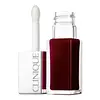What's inside
What's inside
 Key Ingredients
Key Ingredients

 Benefits
Benefits

 Concerns
Concerns

 Ingredients Side-by-side
Ingredients Side-by-side

Polyglyceryl-2 Isostearate/Dimer Dilinoleate Copolymer
EmollientPolyglyceryl-2 Triisostearate
EmulsifyingCaprylic/Capric Triglyceride
MaskingSimmondsia Chinensis Seed Oil
EmollientDiisostearyl Malate
EmollientTocopheryl Acetate
AntioxidantSilica Dimethyl Silylate
Emollient1,2-Hexanediol
Skin ConditioningVaccinium Angustifolium Fruit Extract
Skin ProtectingAngelica Archangelica Extract
Skin ConditioningMorus Alba Leaf Extract
Skin ConditioningMorus Alba Flower Extract
Actinidia Chinensis Fruit Extract
EmollientSolanum Melongena Fruit Extract
Skin ConditioningAloe Barbadensis Flower Extract
EmollientCurcuma Longa Root Extract
MaskingCoral Extract
Skin ConditioningOcimum Sanctum Leaf Extract
Skin ConditioningLycium Barbarum Fruit Extract
AstringentOrange Roughy Oil
Skin ConditioningCitrus Aurantium Dulcis Peel Oil
MaskingCitrus Limon Seed Oil
MaskingSodium Hyaluronate
HumectantEthylhexylglycerin
Skin ConditioningCarum Carvi Seed Oil
MaskingWater
Skin ConditioningButylene Glycol
HumectantTocopherol
AntioxidantLimonene
PerfumingCitral
PerfumingPolyglyceryl-2 Isostearate/Dimer Dilinoleate Copolymer, Polyglyceryl-2 Triisostearate, Caprylic/Capric Triglyceride, Simmondsia Chinensis Seed Oil, Diisostearyl Malate, Tocopheryl Acetate, Silica Dimethyl Silylate, 1,2-Hexanediol, Vaccinium Angustifolium Fruit Extract, Angelica Archangelica Extract, Morus Alba Leaf Extract, Morus Alba Flower Extract, Actinidia Chinensis Fruit Extract, Solanum Melongena Fruit Extract, Aloe Barbadensis Flower Extract, Curcuma Longa Root Extract, Coral Extract, Ocimum Sanctum Leaf Extract, Lycium Barbarum Fruit Extract, Orange Roughy Oil, Citrus Aurantium Dulcis Peel Oil, Citrus Limon Seed Oil, Sodium Hyaluronate, Ethylhexylglycerin, Carum Carvi Seed Oil, Water, Butylene Glycol, Tocopherol, Limonene, Citral
Hydrogenated Polyisobutene
EmollientTriisostearyl Citrate
EmollientPentaerythrityl Tetraethylhexanoate
EmollientPolyglyceryl-2 Triisostearate
EmulsifyingHydrogenated Polydecene
EmollientRicinus Communis Seed Oil
MaskingDipentaerythrityl Tri-Polyhydroxystearate
EmollientCarthamus Tinctorius Seed Oil
MaskingOlea Europaea Fruit Oil
MaskingSimmondsia Chinensis Seed Oil
EmollientSilica
AbrasiveTocopheryl Acetate
AntioxidantCurcuma Longa Root Extract
MaskingGlycine Soja Seed Extract
Skin ConditioningCeramide Ns
Skin ConditioningSqualane
EmollientLactobacillus Ferment
Skin ConditioningHelianthus Annuus Seed Oil
EmollientLauryl PCA
HumectantCaprylyl Glycol
EmollientDimethicone
EmollientPolysilicone-11
Water
Skin ConditioningTetrahexyldecyl Ascorbate
AntioxidantPentaerythrityl Tetra-Di-T-Butyl Hydroxyhydrocinnamate
AntioxidantMica
Cosmetic ColorantCI 77491
Cosmetic ColorantCI 77492
Cosmetic ColorantCI 77499
Cosmetic ColorantCI 45410
Cosmetic ColorantCI 17200
Cosmetic ColorantCI 77891
Cosmetic ColorantCI 77742
Cosmetic ColorantCI 19140
Cosmetic ColorantCI 45380
Cosmetic ColorantCI 73360
Cosmetic ColorantCI 75470
Cosmetic ColorantCI 77163
Cosmetic ColorantCI 15850
Cosmetic ColorantCI 45370
Cosmetic ColorantCI 42090
Cosmetic ColorantCI 15985
Cosmetic ColorantHydrogenated Polyisobutene, Triisostearyl Citrate, Pentaerythrityl Tetraethylhexanoate, Polyglyceryl-2 Triisostearate, Hydrogenated Polydecene, Ricinus Communis Seed Oil, Dipentaerythrityl Tri-Polyhydroxystearate, Carthamus Tinctorius Seed Oil, Olea Europaea Fruit Oil, Simmondsia Chinensis Seed Oil, Silica, Tocopheryl Acetate, Curcuma Longa Root Extract, Glycine Soja Seed Extract, Ceramide Ns, Squalane, Lactobacillus Ferment, Helianthus Annuus Seed Oil, Lauryl PCA, Caprylyl Glycol, Dimethicone, Polysilicone-11, Water, Tetrahexyldecyl Ascorbate, Pentaerythrityl Tetra-Di-T-Butyl Hydroxyhydrocinnamate, Mica, CI 77491, CI 77492, CI 77499, CI 45410, CI 17200, CI 77891, CI 77742, CI 19140, CI 45380, CI 73360, CI 75470, CI 77163, CI 15850, CI 45370, CI 42090, CI 15985
Ingredients Explained
These ingredients are found in both products.
Ingredients higher up in an ingredient list are typically present in a larger amount.
Curcuma Longa Root Extract is from the spice, turmeric. Besides being a healthy and delicious spice, turmeric also has plenty of skincare benefits. It has anti-inflammatory, antioxidant, and anti-microbial properties.
Turmeric contains curcumin, an antioxidant. Antioxidants help neutralize unstable free-radical molecules. Free-radical molecules may damage your skin's cells and DNA. Curcumin may help with anti-aging.
Curcumin also has anti-inflammatory properties and can help soothe skin and reduce irritation. On top of that, curcumin has been shown to help prevent hyperpigmentation from sun damage.
The anti-microbial property of turmeric can make it effective in treating acne. This property has also been shown to help regulate the production of sebum.
Learn more about Curcuma Longa Root ExtractThis ingredient is a form of glycerin with emulsifying and emollient properties.
As an emulsifier, this ingredient helps keep products together while adding a thick texture. The manufacturer states this ingredient has emollient properties. Emollients help keep the skin hydrated by trapping moisture in.
Polyglyceryl-2 Triisostearate is created by reacting diglycerin and isostearic acid. Due to the isostearic acid base, it may not be safe for Malassezia or fungal acne.
Learn more about Polyglyceryl-2 TriisostearateThis oil comes from the seeds of the desert shrub called Jojoba. It is more commonly known as jojoba oil, a non-comedogenic oil.
Jojoba oil does not contain fragrance and has many fatty-acids, making it a great soothing ingredient.
It also contains Vitamin E, a great moisturizing ingredient. Vitamin E is also an antioxidant and protects your skin against oxidative damage.
This ingredient humectant properties, meaning it helps draw moisture from the air. This helps keep your skin hydrated.
While jojoba has antibacterial properties, it is only able to kill some strains of bacteria.
Studies also show it helps in wound healing. In fact, Indigenous cultures have used jojoba as a moisturizer and to help treat burns for centuries.
Fun fact: Jojoba oil similar to natural human skin sebum, so it has a great effect on dry skin. It is also promising with helping to regulate sebum production.
Due to its fatty acid content, Jojoba oil may not be fungal acne safe. We recommend speaking with a professional if you have any concerns.
Learn more about Simmondsia Chinensis Seed OilTocopheryl Acetate is AKA Vitamin E. It is an antioxidant and protects your skin from free radicals. Free radicals damage the skin by breaking down collagen.
One study found using Tocopheryl Acetate with Vitamin C decreased the number of sunburned cells.
Tocopheryl Acetate is commonly found in both skincare and dietary supplements.
Learn more about Tocopheryl AcetateWater. It's the most common cosmetic ingredient of all. You'll usually see it at the top of ingredient lists, meaning that it makes up the largest part of the product.
So why is it so popular? Water most often acts as a solvent - this means that it helps dissolve other ingredients into the formulation.
You'll also recognize water as that liquid we all need to stay alive. If you see this, drink a glass of water. Stay hydrated!
Learn more about Water